Holiday Scams: 15 Malware Attacks To Watch

It's Christmas Time For Hackers
With the endless list of things to do during the holidays, double checking a URL or calling the Better Business Bureau probably isn't high on your list. And hackers count on that.
Hackers typically take advantage of users' lack of time and money during the holiday season to unleash a slew of malware and phishing attacks. And true to form, this holiday season is no exception. While many offers appear to be legitimate, in reality, they're only designed to download malware onto victims' computers or steal personal information. And no one wants malware for Christmas.
So we've compiled a few of the most recent holiday scams, spams and phishing attacks you might see this December.
Enjoy and have a very, wary holiday.
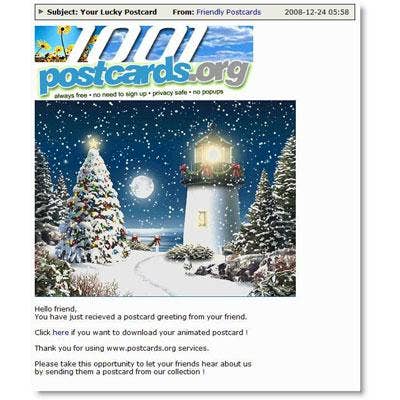
Picture Perfect eCard Virus
Okay, the snowy Christmas scene looks enticing. And no doubt, it's very tempting to click on the provided link to get a glimpse of the offered animated card. But notice, this e-card, provided by researchers at AppRiver, never said WHICH friend sent the user the Christmas card -- a detail that should automatically raise suspicion with recipients.
But don't let the pastoral Christmas scene or grammatically correct sentences fool you. Chances are, the link actually contains some kind of malware. Also notice, the card entices the user to resend the card to all of his or her contacts, presumably to further distribute attack.
No matter how attractive or authentic-looking, play it safe this season and refrain from clicking on e-card links.
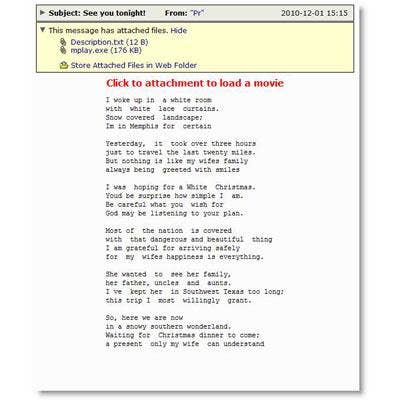
Emotional Appeal
Let's call it a double whammy. This one, provided by AppRiver, attempts to pull at the heart strings, while simultaneously exploiting users' inflated sense of generosity over the holidays. In this letter, the spam artists play up the sentiment with a cheesy letter about personal hardship, coupled with several executable file attachments vaguely claiming to be movie-related downloads.
However, the blatant grammatical errors throughout the message, not to mention the sickening emotionalism, might be a dead giveaway that this is a hoax.
Meanwhile, Fred Touchette, senior security analyst at AppRiver, says, "If you don’t' recognize the sender, delete it. If the e-mail is not addressed to you specifically, delete it. If you're instructed to download an executable program, delete it."
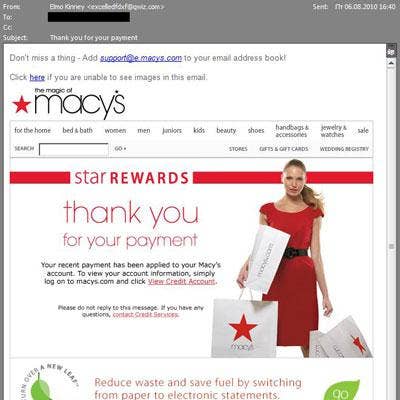
Sale At Macys
Looks convincing? Cyber criminals know that there is one unifying activity that will catch the attention of almost all their potential victims during the holidays: shopping. In this attack, provided by researchers at Kaspersky Lab, cyber hackers have spoofed a well-known shopping brand, used reasonably high quality graphics, and avoided the obvious typos associated with generic spam, in order to increase credibility and achieve higher traffic volumes.
Hackers are increasingly relying on spoofed pages to create an air or authenticity and establish credibility with potential victims. There are a few giveaways in this scam however. Instead of originating from Macys.com, the phishing e-mail is sent from an unknown source. It also solicits the user with a request to view their account information -- another request that should inevitably raise doubts.
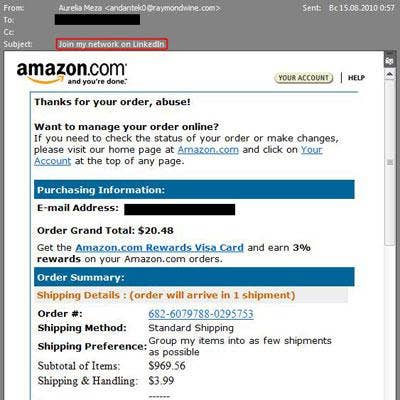
Amazon Scam
Hackers aren't known to be risk takers. Thus, it's no secret that they routinely exploit tried and true brands to generate traffic needed to profitably distribute malware. This attack, provided by Kaspersky Lab, provides another example of attacks that use a familiar brand that nearly all Internet users have previously used, and are very likely to use again during the holiday season.
Recipients can spot the obvious typo in the subject line regarding the Linked-In social network, which doesn’t match the content of the email, and should be an immediate red-flag. Additionally, the source of the e-mail doesn't appear to be from Amazon.com -- another big warning sign.
When in doubt, play it safe and go directly to the actual site.
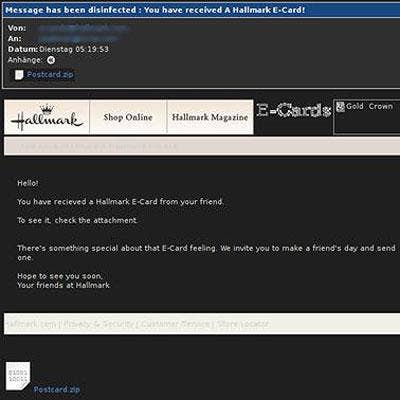
The Hallmark Of Malware
With the greeting card season in full swing, hackers are revving their engines and preparing to send a slew of malware-laden "holiday" messages. In this attack, provided by Kaspersky Lab, hackers are hoping to compel users to click the embedded links and attachments by branding their messages with fake Hallmark logos.
One big red flag is that the card immediately directed the user to the provided attachments, instead of displaying a cheery holiday card. But instead of a warm and fuzzy greeting card, users will likely just end up with holiday malware and some identity theft cleanup for the holidays.
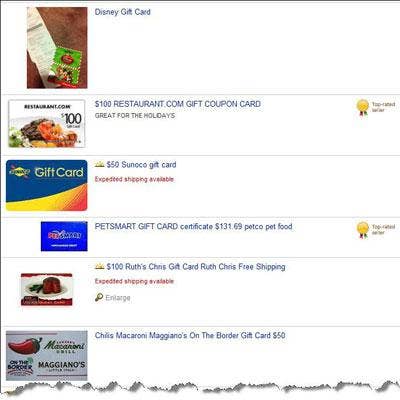
Gift Card Bonanza
Let's face it -- gift cards provide the perfect solution for the time-strapped shopper with someone that they either don't know that well or seems to have everything already. Unfortunately, the hackers know this too, which is why there are so many online auction sites offering gift cards for just about every store imaginable.
While it might be tempting, don't be fooled. Security researchers at AppRiver warn users to avoid buying gift cards from online auction sites. More often than not, the cards are likely to be counterfeit, used and not contain the promised amount, or are altogether fraudulent.
If a gift card really is the answer, go directly to the store or the store's actual Web site.

Fake Letter From Santa (Is Nothing Sacred?)
It's a great idea for the kids. And who doesn't want to make their kids Christmas a little more special with an authentic-looking letter from Santa? In this scam, provided by researchers at AppRiver, the cyber thieves even offer a postmarked letter from the North Pole signed by the big guy himself.
But like anything else, parents need to do their homework. There are many organizations out there that are fraudulent offering phony letters in exchange for credit card numbers and personally identifying information.
So be safe, and check with the Better Business Bureau to verify that the company in question is legitimate and has been in business for a while.
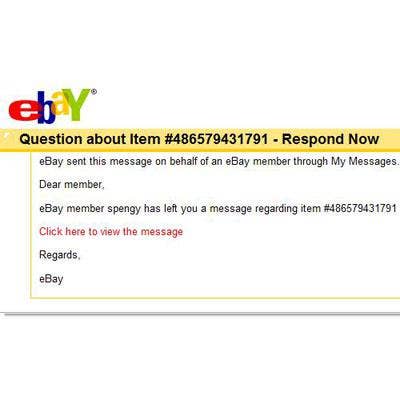
No, Nothing Is Wrong With Your eBay Account.
It's the typical account scam, provider by AppRiver, in which a hacker sends a fake query to a user, warning them that something is wrong with an account or order, and then asks for them to submit their login, banking or credit card numbers.
However, during the holiday rush, users worried about the arrival of their package might be inclined to click on the embedded links to check on the status of their orders. And hackers are all too eager to exploit stress and worry regarding on-time package delivery with a phishing attack like this one.
In general, security experts warn users to avoid following links provided in e-mails, especially if they are unsure of the sender. If in doubt about the status of a package, call or go directly to the site itself for confirmation.
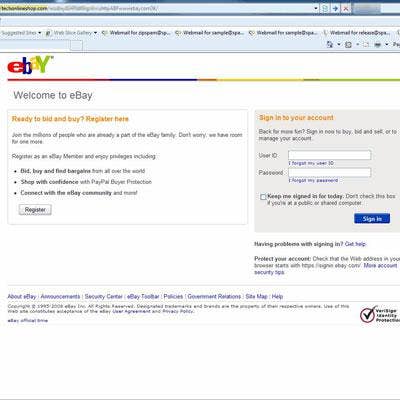
Deceiving Appearances
Did we mention hackers were getting more sophisticated?
Indeed, hackers are becoming much more adept at replicating legitimate and high-trafficked e-commerce sites. Case in point: while this eBay site might look real, the unknown URL at the top of the page indicates that the site is fake.
Victims unaware of this eBay spoofing scam, provided by AppRiver, will unknowingly submit their username and passwords, unaware that they have just given hackers unadulterated access to their eBay accounts.
Subsequently, be suspicious of any login page that is sent to you, no matter how convincing. Instead, just go directly to the legitimate site before entering precious login credentials.

Product Spam Scam
With the Christmas shopping season well underway, be prepared for a maelstrom of product spam. While some might be legitimate, the vast majority will likely be scams and frauds.
This product spam message, provided by researchers at Symantec, offers personalized Christmas ornaments. While ostensibly a nice Christmas gift idea, the site is fraudulent, and users will likely end up only giving away their credit card details to scammers or download holiday malware by clicking on the embedded links.
So don't take the chance. When ordering gifts online, go directly to established and reputable sites, preferably ones with which you've had good experiences in the past.

Short On Cash?
Have no fear, there is no shortage of offers to wire copious amounts of money into your bank account very quickly and all at low interest rates. The only problem is, most of it is fake.
In this scam, provided by researchers at Symantec, cyber thieves aim to exploit cash-strapped users with an offer to wire $1,500 right into the user's bank account. They even attempt to add legitimacy to the site with an unofficial padlock symbol (in the wrong place.) Of course, all users have to do is submit a slew of personal information -- which is what the hackers were after in the first place.
Meanwhile, victims will likely never see a dime of their payday loan, but instead be cleaning up the residual mess after hackers steal their identities.

Wanna Buy A Rolex?
Sure you do. Hey, if you don't have the money for an actual Rolex Daytona or a Gucci handbag, surely a cheap knock-off will suffice.
During the holiday season, scammers emerge from the woodwork to offer everything from fake jewelry to watches to clothes and accessories. But be discerning when wading through the oceans of product spam, such as this one, provided by Symantec. Chances are the products users will receive will be disappointing at best or non-existent at worst. The good news is, there are plenty of available legitimate discount outlets and sites if a replication is really what you're after. You just have to work a little harder to find it.
Remember, the old adage still applies, if it looks too good to be true, it probably is.
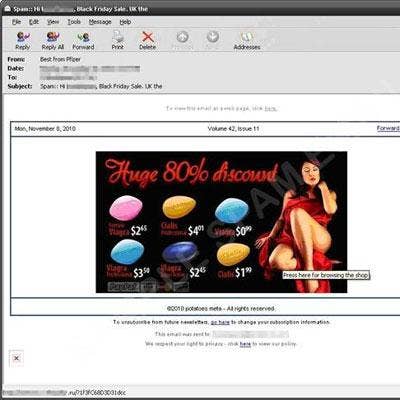
Viagra For Christmas?
All too often, product spammers will lure users with Christmas or holiday-related subject lines in the e-mails, only to pelt them with completely unrelated offers.
In this case, provided by researchers at Trend Micro, the Black Friday Sale subject line was used to entice users to open the spam message. Once opened, users were treated to ads for Viagra and other bogus pharmaceuticals, offered at huge discounts. In reality, the offer is likely just an attempt to capture credit card and other personal information.
In general, steer clear of unsolicited offers for just about anything, especially if the subject line is deliberately misleading.
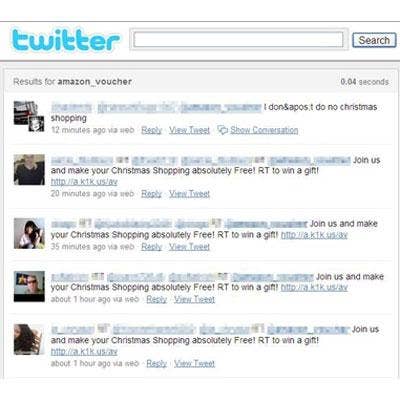
Malicious Xmas Tweets
Be forewarned, scammers will gravitate toward social networks to distribute holiday malware and phishing attacks on a large scale. What's more, hackers will also continue to exploit inherent trust on these sites by using spoofed social networking profiles to circulate malicious links.
In this phishing attack, provided by Trend Micro, scammers are enticing users to click on embedded links with Christmas-themed promotions. However, chances are that the links will lead to malware sites that download malicious code onto users' computers.
So be wary of embedded links, even if they appear to come from someone you know. If you have a few doubts that your social networking friend is now an advocate for a discount Christmas outlet, play it safe and delete the entry.

Amazon Voucher: Something For Nothing
Everyone likes to get something for free. In this attack, provided by Trend Micro, hackers offer the so-called "winners" an Amazon voucher, just in time for the holidays. All users have to do is sign up.
In reality, the offer is fake, and the alleged recipients will never see a voucher from Amazon or anywhere else. Instead, they'll likely subject themselves to holiday malware or phishing attacks when they click on the links and enter personally identifying information.
The holidays especially are rife with promotions, offers and contests. But it's all too easy to sign up for something you didn't want or fall victim to a phishing attack. Best advice is to avoid them altogether, and save yourself a little grief.